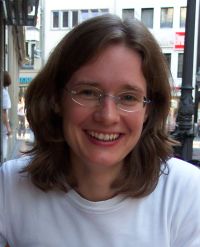Dr. Eva Lasarcyk 
Department of Computational Linguistics and Phonetics
Building C7.2
Saarland University
66041 Saarbrücken

I joined Speech at Amazon in December 2014. However, I still receive, and intermittently read, my coli emails in case you would like to contact me.
Recent Activities
Research Areas
I am interested in state-of-the-art speech technology and its use in everyday life as well as in research, currently using synthesis techniques to study human speech production and perception.
PhD Thesis using VocalTractLab
I completed my Ph.D. thesis in phonetics under the supervision of Prof. emeritus William J. Barry and Prof. Dr. Bernd Möbius, at the department of
Computational Linguistics and Phonetics,
Saarland University, and the
International Research Training Group Language Technology and Cognitive Systems.
I have used the articulatory speech synthesis system VocalTractLab, developed by Peter Birkholz, to explore production and perception aspects of articulatory synthetic speech.
The speech phenomena investigated so far include larynx height and voice quality, laughter in conversational speech, speech laughs and smiled speech, means to convey (un-)certainty in speech, synthesis of vocal age, and the articulatory simulation of a German regional accent (Saxon).
The studies are mostly explorative in nature to find out how well the articulatory speech synthesis system is suited as a "discovery tool" for phonetic research, where the goal is to investigate articulatory processes in speech production. The experiments cover sub-glottal, glottal and supra-glottal aspects of speech production, and they are evaluated by acoustic, visual-articulatory, and perceptual means.
At our institute, Ingmar Steiner also worked with this articulatory synthesis software.
Past Activities
Documents
Website Relation Extraction in the Food Domain.
(PR) indicates peer-reviewed publications.


